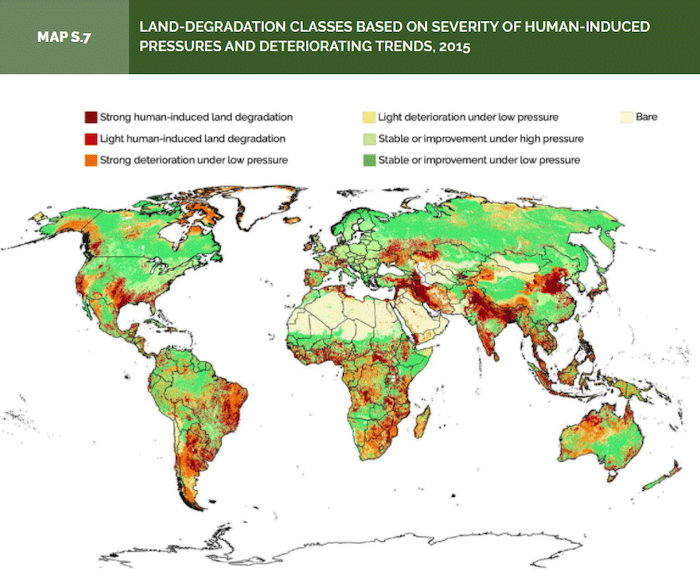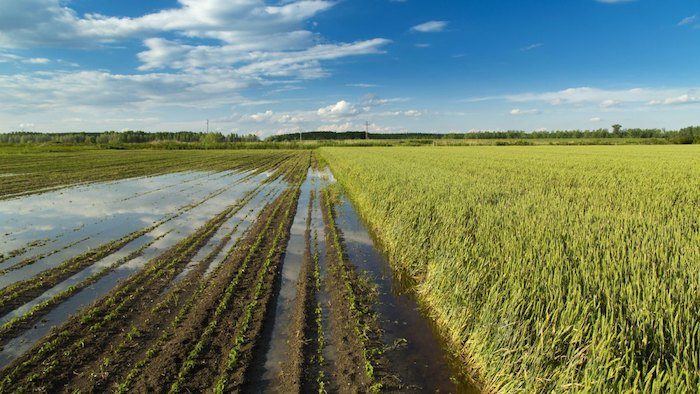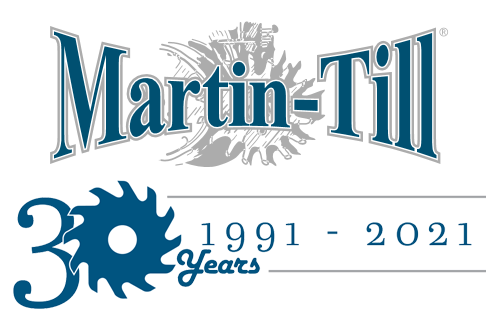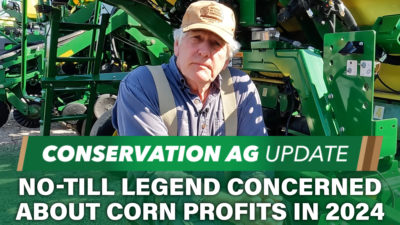A new report from the United Nations Food and Agriculture Organization (FAO) warns the land and water resources farmers rely on to feed the world are stressed to “a breaking point.” But no-till and other sustainable agriculture practices can help bring the world back from the brink, while continuing to provide food for generations to come.
The global population has risen by more than 25% over the past 20 years, but the amount of land used to grow crops has only increased by about 4%, according to this article from Yale Climate Connections. Farmers have met the growing demand for food by improving productivity on agricultural land through increased use of machinery, irrigation, fertilizers and pesticides.
“Human-induced degradation affects 34% (4.1 billion acres) of agricultural land,” the FAO report says. “The treatment of soils with inorganic fertilizers to increase or sustain yields has had significant adverse effects on soil health and has contributed to freshwater pollution induced by run-off and drainage.”
Irrigated farmland is a prime example of the benefits and detriments of the modern agricultural system. Irrigation produces 2-3 times as much food per acre as non-irrigated land, but it also increases fertilizer and pesticide runoff.
According to FAO, agriculture accounts for 72% of all surface and groundwater withdrawals, a 20% increase in the last decade. The demand for irrigation continues to increase as extreme droughts due to a changing climate become more frequent.
 Map of global soil degradation. (Source: UN FAO State of the world’s land and water resources for food and agriculture report)
Map of global soil degradation. (Source: UN FAO State of the world’s land and water resources for food and agriculture report)
The report says 13% of all soil worldwide, including 34% of agricultural land, is degraded. Excessive fertilizer use, livestock overgrazing causing soil compaction and erosion, deforestation and decreasing water availability contribute to the problem.
Almost 10% of the 8 billion people on earth today are already undernourished. By 2050, there will be 2 billion more mouths to feed, according to the report, leading to an anticipated 50% increase in food demand. In order to increase crop production to meet the demand, the FAO report recommends four action areas:
- Adopt inclusive land and water governance through improved land-use planning to guide land and water allocation and promote sustainable resources management.
- Implement integrated solutions at scale, including helping farmers use available resources more efficiently while minimizing the associated adverse environmental impacts and building resilience to climate change.
- Embrace innovative technologies and management like remote sensing services; opening access to data and information on crops, natural resources and climatic conditions; and improving rainwater capture and increasing soil moisture retention.
- Invest in long-term sustainable land, soil and water management; in restoring degraded ecosystems; and in data and information management for farmers.
Sustainable agriculture practices like no-till and cover cropping will make a difference in restoring soil health, adapting to a changing climate and feeding a booming population, but the report notes there’s no “one-size-fits-all” solution. FAO believes focusing on land and water governance is essential to create the changes needed to achieve patterns of sustainable agriculture.
“Treating land and soils with care and managing water responsibly can be emphasized through knowledge-based approaches, particularly when targeted through landscape or environmental services approaches,” the report says.
Related Content
Erosion Poised to Cause Unprecedented Food Shortages Worldwide: The world may be on the edge of unprecedented crop loss and food shortages if soil erosion continues to intensify worldwide.
No-Till Provides Potential for 300% Yield Increases for Kenyan Farmers: Two Kenyan farmers share how adopting no-till improved their yields, soil health and communities.
Farming for the Future: South African No-Tiller Improving Soil, Combating Climate Crisis: Danie Bester demonstrates that no-till is a profitable and sustainable choice for South African farmers.
The No-Till Passport series is brought to you by Martin Industries.
Since 1991, Martin Industries has designed, manufactured and sold leading agriculture equipment across the U.S. and Canada. Known for Martin-Till planter attachments, the company has expanded to include a five-step planting system, closing wheel systems, twisted drag chains, fertilizer openers and more in their lineup. Their durable and reliable planter attachments are making it possible for more and more farmers to plant into higher levels of residue.









Post a comment
Report Abusive Comment